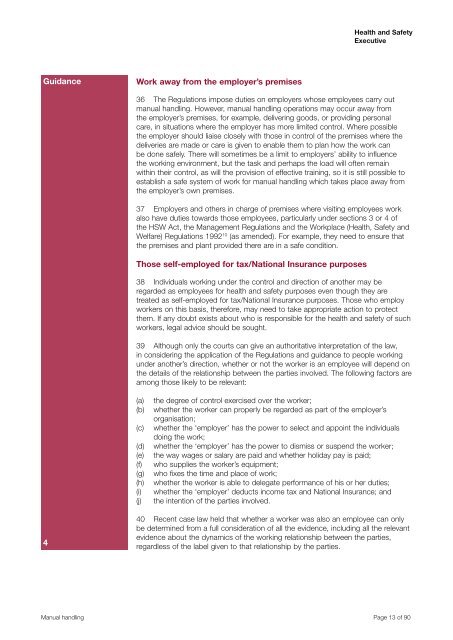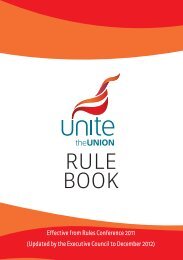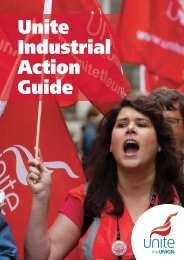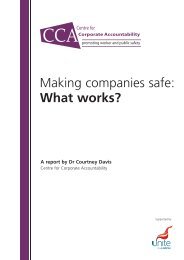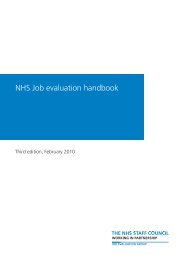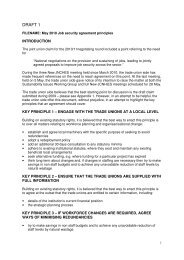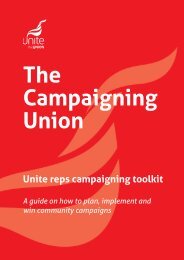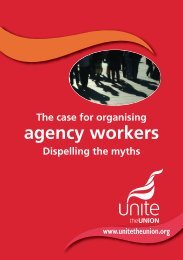Manual Handling Manual Handling Operations Regulations 1992 ...
Manual Handling Manual Handling Operations Regulations 1992 ...
Manual Handling Manual Handling Operations Regulations 1992 ...
You also want an ePaper? Increase the reach of your titles
YUMPU automatically turns print PDFs into web optimized ePapers that Google loves.
Health and Safety<br />
Executive<br />
Guidance<br />
Work away from the employer’s premises<br />
36 The <strong>Regulations</strong> impose duties on employers whose employees carry out<br />
manual handling. However, manual handling operations may occur away from<br />
the employer’s premises, for example, delivering goods, or providing personal<br />
care, in situations where the employer has more limited control. Where possible<br />
the employer should liaise closely with those in control of the premises where the<br />
deliveries are made or care is given to enable them to plan how the work can<br />
be done safely. There will sometimes be a limit to employers’ ability to influence<br />
the working environment, but the task and perhaps the load will often remain<br />
within their control, as will the provision of effective training, so it is still possible to<br />
establish a safe system of work for manual handling which takes place away from<br />
the employer’s own premises.<br />
37 Employers and others in charge of premises where visiting employees work<br />
also have duties towards those employees, particularly under sections 3 or 4 of<br />
the HSW Act, the Management <strong>Regulations</strong> and the Workplace (Health, Safety and<br />
Welfare) <strong>Regulations</strong> <strong>1992</strong> 10 (as amended). For example, they need to ensure that<br />
the premises and plant provided there are in a safe condition.<br />
Those self-employed for tax/National Insurance purposes<br />
38 Individuals working under the control and direction of another may be<br />
regarded as employees for health and safety purposes even though they are<br />
treated as self-employed for tax/National Insurance purposes. Those who employ<br />
workers on this basis, therefore, may need to take appropriate action to protect<br />
them. If any doubt exists about who is responsible for the health and safety of such<br />
workers, legal advice should be sought.<br />
39 Although only the courts can give an authoritative interpretation of the law,<br />
in considering the application of the <strong>Regulations</strong> and guidance to people working<br />
under another’s direction, whether or not the worker is an employee will depend on<br />
the details of the relationship between the parties involved. The following factors are<br />
among those likely to be relevant:<br />
(a)<br />
(b)<br />
(c)<br />
(d)<br />
(e)<br />
(f)<br />
(g)<br />
(h)<br />
(i)<br />
(j)<br />
the degree of control exercised over the worker;<br />
whether the worker can properly be regarded as part of the employer’s<br />
organisation;<br />
whether the ‘employer’ has the power to select and appoint the individuals<br />
doing the work;<br />
whether the ‘employer’ has the power to dismiss or suspend the worker;<br />
the way wages or salary are paid and whether holiday pay is paid;<br />
who supplies the worker’s equipment;<br />
who fixes the time and place of work;<br />
whether the worker is able to delegate performance of his or her duties;<br />
whether the ‘employer’ deducts income tax and National Insurance; and<br />
the intention of the parties involved.<br />
4<br />
40 Recent case law held that whether a worker was also an employee can only<br />
be determined from a full consideration of all the evidence, including all the relevant<br />
evidence about the dynamics of the working relationship between the parties,<br />
regardless of the label given to that relationship by the parties.<br />
<strong>Manual</strong> handling Page 13 of 90


